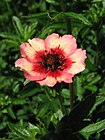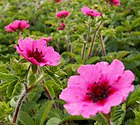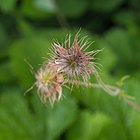Note: This is a project under development. The articles on this wiki are just being initiated and broadly incomplete. You can Help creating new pages.
Difference between revisions of "Potentilla nepalensis"
| (One intermediate revision by the same user not shown) | |||
| Line 1: | Line 1: | ||
| − | [[File:Tuinen Mien Ruys (actm) 22 | + | [[File:Tuinen Mien Ruys (actm) 22.jpg|thumb|right]] |
'''Potentilla nepalensis''' is a perennial plant that can grow up to 0.60 metres tall. It is harvested from the wild for local use as a food and medicine. | '''Potentilla nepalensis''' is a perennial plant that can grow up to 0.60 metres tall. It is harvested from the wild for local use as a food and medicine. | ||
==Uses== | ==Uses== | ||
| Line 8: | Line 8: | ||
==Chemical Composition== | ==Chemical Composition== | ||
| − | <ref name="chemical composition"/> | + | Phytochemical constituents in the aerial and underground parts. In vitro and in vivo pharmacological studies are reviewed and discussed, focussing on antidiarrhoic.<ref name="chemical composition"/> |
==Common names== | ==Common names== | ||
| Line 68: | Line 68: | ||
<references> | <references> | ||
| − | <ref name="chemical composition">[ | + | <ref name="chemical composition">[https://www.researchgate.net/publication/223896627_Potentilla-A_review_of_its_phytochemical_and_pharmacological_profile Chemical constituents]</ref> |
<ref name="Leaf">[Morphology]</ref> | <ref name="Leaf">[Morphology]</ref> | ||
Latest revision as of 16:15, 23 July 2020
Potentilla nepalensis is a perennial plant that can grow up to 0.60 metres tall. It is harvested from the wild for local use as a food and medicine.
Contents
- 1 Uses
- 2 Parts Used
- 3 Chemical Composition
- 4 Common names
- 5 Properties
- 6 Habit
- 7 Identification
- 8 List of Ayurvedic medicine in which the herb is used
- 9 Where to get the saplings
- 10 Mode of Propagation
- 11 How to plant/cultivate
- 12 Commonly seen growing in areas
- 13 Photo Gallery
- 14 References
- 15 External Links
Uses
Burns, Inflammations, Wounds, Cancer, Infections due to bacteria, Fungi, Diarrhoea.[1]
Parts Used
Chemical Composition
Phytochemical constituents in the aerial and underground parts. In vitro and in vivo pharmacological studies are reviewed and discussed, focussing on antidiarrhoic.[2]
Common names
| Language | Common name |
|---|---|
| Kannada | |
| Hindi | Laljharhi |
| Malayalam | |
| Tamil | |
| Telugu | |
| Marathi | |
| Gujarathi | |
| Punjabi | |
| Kashmiri | |
| Sanskrit | |
| English | Nepal cinquefoil |
Properties
Reference: Dravya - Substance, Rasa - Taste, Guna - Qualities, Veerya - Potency, Vipaka - Post-digesion effect, Karma - Pharmacological activity, Prabhava - Therepeutics.
Dravya
Rasa
Guna
Veerya
Vipaka
Karma
Prabhava
Habit
Identification
Leaf
| Kind | Shape | Feature |
|---|---|---|
Flower
| Type | Size | Color and composition | Stamen | More information |
|---|---|---|---|---|
| {{{5}}} |
Fruit
| Type | Size | Mass | Appearance | Seeds | More information |
|---|---|---|---|---|---|
Other features
List of Ayurvedic medicine in which the herb is used
Where to get the saplings
Mode of Propagation
How to plant/cultivate
A very tolerant and easily grown plant, surviving considerable neglect. It grows best in a well-drained loam, preferring a position in full sun but tolerating shade. Prefers an alkaline soil but tolerates a slightly acid soil.[4]
Commonly seen growing in areas
Grazing grounds, Cultivated areas.
Photo Gallery
References
- ↑ Indian Medicinal Plants by C.P.Khare
- ↑ Chemical constituents
- ↑ [Morphology]
- ↑ Cultivation
External Links
- Ayurvedic Herbs known to be helpful to treat Burns
- Herbs with Inflammations used in medicine
- Herbs with Wounds used in medicine
- Herbs with Cancer used in medicine
- Herbs with Infections due to bacteria used in medicine
- Herbs with Fungi used in medicine
- Herbs with Diarrhoea used in medicine
- Herbs with Roots used in medicine
- Herbs with common name in Hindi
- Herbs with common name in English
- Habit - Perennial
- Index of Plants which can be propagated by Seeds
- Index of Plants which can be propagated by Division in spring
- Herbs that are commonly seen in the region of Grazing grounds
- Herbs that are commonly seen in the region of Cultivated areas
- Herbs
- Pages without herbs images





